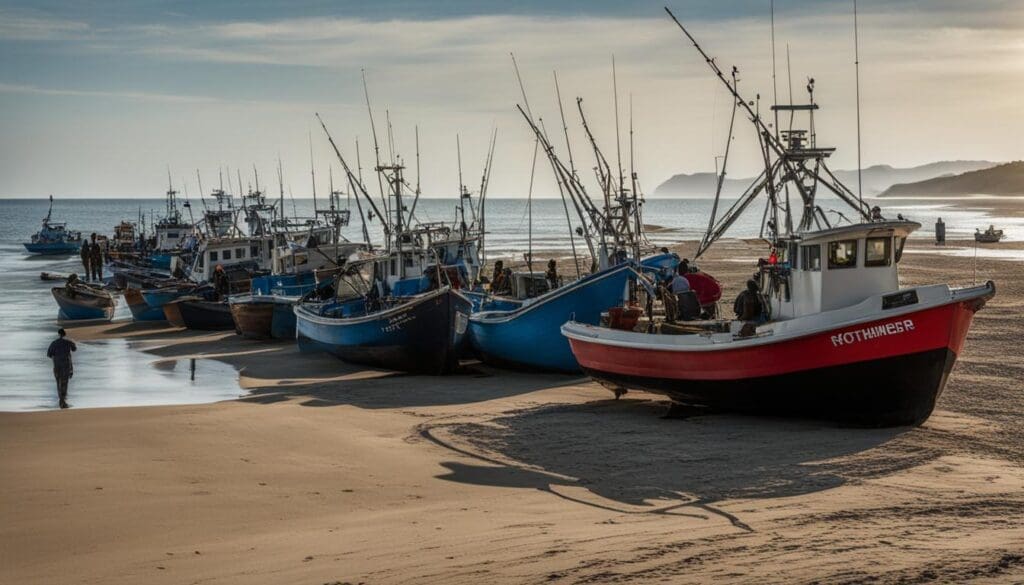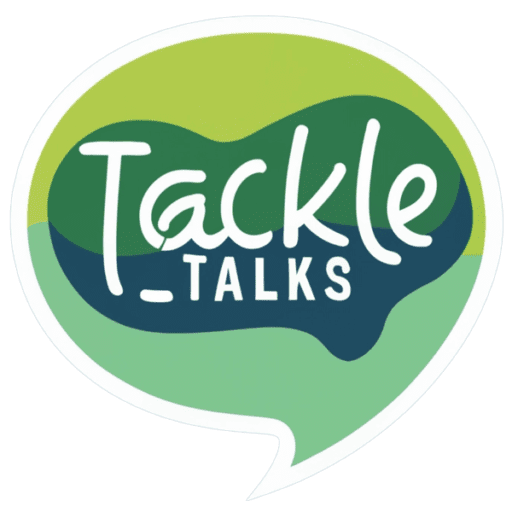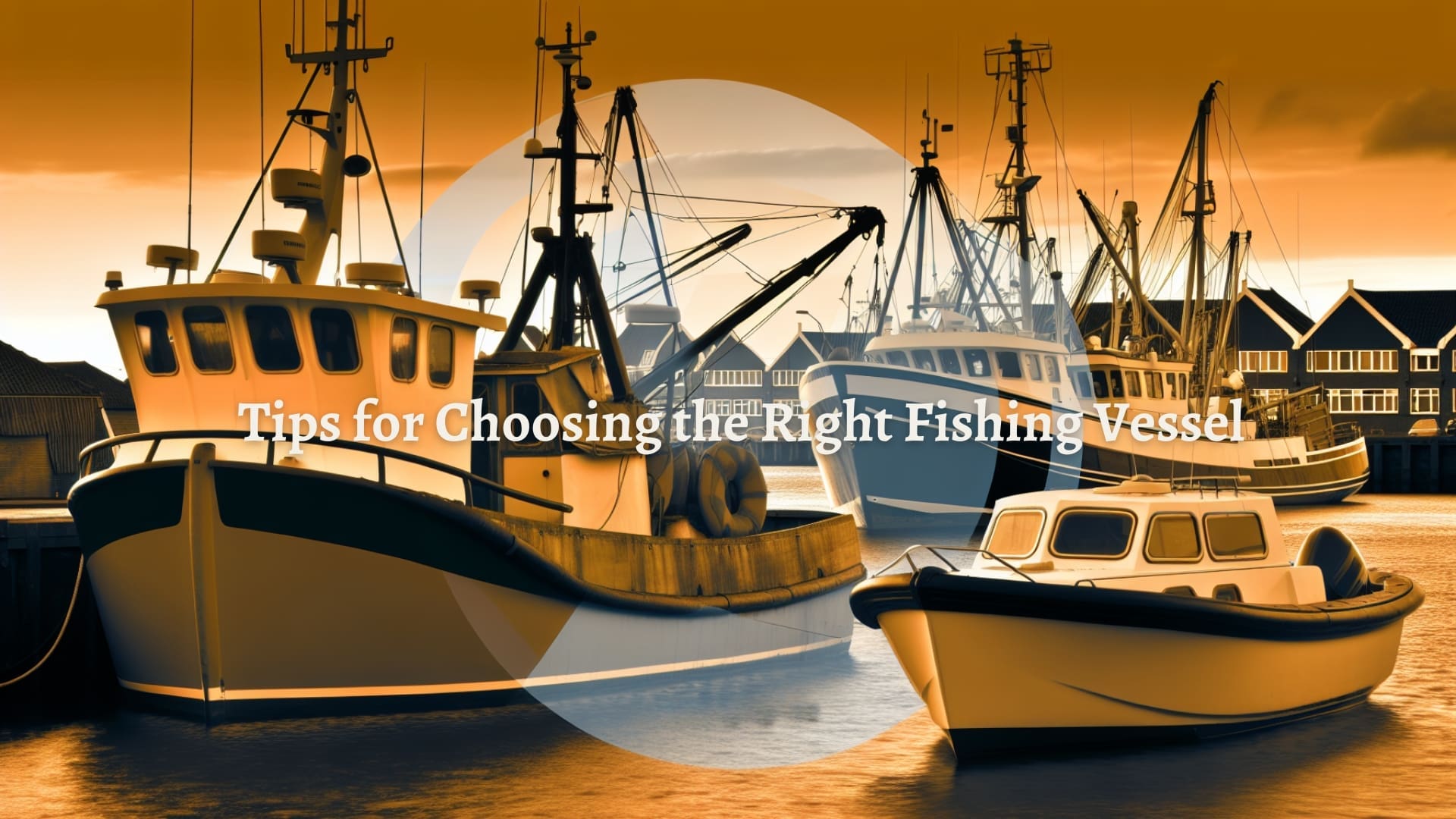Choosing the right fishing boat is crucial for angling success. Whether you’re a seasoned angler or just starting out, selecting the perfect fishing vessel can greatly enhance your fishing experience. From identifying your specific fishing needs to evaluating different boat types and considering features and functionalities, there are several factors to take into account. In this guide, we will provide you with practical tips and insights to help you make an informed decision when it comes to choosing a fishing boat.
Key Takeaways:
- Identify your specific fishing needs, including the type of water, target species, and preferred fishing techniques.
- Evaluate different boat types such as bass boats, center console boats, and pontoon boats to find one that aligns with your fishing goals.
- Consider the size of the boat, taking into account factors like deck space, storage capacity, and seating capacity.
- Assess the features and functionalities offered by different boats, such as fish finders, trolling motor systems, live wells, and rod holders.
- Set a realistic budget that includes not only the upfront cost but also long-term expenses like maintenance, fuel, insurance, and storage fees.
Identifying Your Fishing Needs
Before choosing a fishing boat, it’s important to identify your specific fishing needs. Understanding your requirements will help you select a boat that best suits your angling style and preferences. Here are some key factors to consider:
Freshwater vs. Saltwater Fishing
Determine whether you will primarily fish in freshwater or saltwater environments. Different types of boats are designed to perform optimally in specific settings, so knowing where you’ll fish most often will help narrow down your options.
Target Species
Consider the type of fish you aim to catch. Certain species may require specialized equipment or specific boat features to increase your chances of success. Whether you’re targeting bass, salmon, or marlin, choose a boat that suits the characteristics of your desired catch.
Fishing Techniques
Think about the fishing techniques you prefer or plan on using. Do you enjoy casting lures, trolling, or fly fishing? Different boats are designed to accommodate various fishing methods, so selecting a boat that aligns with your preferred techniques will enhance your angling experience.
By carefully considering your fishing needs, you can narrow down your options when choosing a fishing boat. Remember to take into account whether you’ll primarily fish in freshwater or saltwater, the target species you want to catch, and the fishing techniques you prefer. This will help ensure that you select the right boat to meet your specific angling requirements.
Note: The image above is for illustrative purposes only and does not represent any specific fishing boat model.
Evaluating Boat Types
When choosing a fishing boat, it’s essential to consider the different types available and their unique advantages. Each boat type is designed to cater to specific fishing needs and environments, ensuring a tailored experience for anglers. Let’s take a closer look at three popular boat types: bass boats, center console boats, and pontoon boats.
Bass Boats
Bass boats are specifically designed for speed and maneuverability in freshwater lakes. They feature a low profile and sleek design, allowing anglers to navigate through shallow waters and tight spaces. Bass boats typically come equipped with powerful outboard motors and a trolling motor system, making them ideal for anglers who enjoy freshwater fishing and targeting bass, as the name suggests. These boats usually have a casting deck at the bow and ample storage compartments for fishing gear and equipment.
Center Console Boats
Center console boats are versatile vessels suitable for various fishing techniques in saltwater environments. They feature an open layout with a centrally located console that houses the helm and other controls. This design provides easy access to all sides of the boat, making it convenient for casting and reeling in fish from any angle. Center console boats are known for their stability and durability, making them suitable for offshore fishing and targeting a wide range of saltwater species. They often come equipped with fish finders, live wells, and rod holders.
Pontoon Boats
Pontoon boats offer stability and comfort, making them an excellent choice for leisurely fishing trips or family outings. These boats have a flat deck supported by pontoons on either side, providing a spacious and stable platform for fishing. Pontoon boats often feature comfortable seating, ample storage space, and even on-board amenities such as a cooking area or restroom facilities. While they may not be as fast or agile as bass boats or center console boats, pontoon boats excel at providing a comfortable and enjoyable fishing experience on calm waters.
| Boat Type | Advantages | Disadvantages |
|---|---|---|
| Bass Boats | • Speed and maneuverability • Ideal for freshwater fishing • Ample storage for gear |
• Limited to freshwater lakes • Less comfortable for leisure activities |
| Center Console Boats | • Versatile for various fishing techniques • Stable and durable for offshore fishing • Easy access from all sides |
• Can be more expensive • Limited seating and amenities |
| Pontoon Boats | • Stability and comfort • Spacious deck for leisurely fishing • On-board amenities available |
• Slower and less maneuverable • Less suitable for rough waters |
Considering Boat Size
When choosing a fishing boat, one of the key factors to consider is the size of the boat. Boat size considerations include deck space, storage capacity, and seating capacity. These factors play a crucial role in determining the comfort, functionality, and suitability of the boat for specific fishing needs.
Having sufficient deck space is important for anglers, as it provides enough room to move around and carry out fishing activities comfortably. It allows for casting lines, reeling in fish, and handling equipment with ease. Additionally, a spacious deck provides anglers the flexibility to accommodate multiple fishing techniques and equipment.
The storage capacity of a fishing boat is another vital aspect to consider. Ample storage compartments provide anglers with the ability to organize and store their fishing gear, such as fishing rods, tackle boxes, and bait. It is essential to have accessible storage spaces that can accommodate all necessary equipment, ensuring a well-prepared and organized fishing experience.
Seating capacity is also an important consideration, especially for anglers who prefer fishing with friends or family. A fishing boat with adequate seating allows for a more sociable and enjoyable fishing trip, providing comfort and convenience for everyone onboard. Consider the number of people who will be accompanying you on fishing trips and choose a boat that can comfortably accommodate them.

Table: Comparison of Boat Size Considerations
| Deck Space | Storage Capacity | Seating Capacity | |
|---|---|---|---|
| Smaller Boats | Limited deck space | Less storage capacity | Usually suitable for 1-2 anglers |
| Larger Boats | More deck space | Ample storage compartments | Can accommodate multiple anglers |
In summary, when choosing a fishing boat, carefully consider the boat size based on deck space, storage capacity, and seating capacity. Assessing these factors will ensure that the chosen boat provides the necessary comfort, functionality, and suitability for successful and enjoyable fishing trips.
Fishing Boat Features and Functionalities
When selecting a fishing boat, it’s important to assess the features and functionalities that are essential for an optimal angling experience. The right boat should be equipped with tools and amenities that enhance efficiency, convenience, and overall enjoyment on the water.
One of the key features to consider is a fish finder, which uses sonar technology to locate fish underwater. A fish finder helps anglers identify the best fishing spots, increasing the chances of a successful catch. Additionally, a trolling motor system is a valuable asset for maneuvering the boat quietly and precisely, allowing for better control while fishing.
“A fish finder helps anglers identify the best fishing spots, increasing the chances of a successful catch.”
Live wells are also important for keeping caught fish alive and fresh during the fishing trip. These wells provide a controlled environment with proper oxygenation and water circulation, ensuring the fish’s well-being until it’s time to return to shore. Furthermore, rod holders are practical accessories that keep fishing rods securely in place, allowing anglers to have their hands free while waiting for a bite.
Table: Fishing Boat Features Comparison
| Feature | Description |
|---|---|
| Fish Finder | Uses sonar technology to locate fish underwater |
| Trolling Motor System | Provides quiet and precise maneuverability |
| Live Wells | Keeps caught fish alive and fresh during the fishing trip |
| Rod Holders | Secures fishing rods in place, leaving hands free |
By carefully assessing these features and functionalities, anglers can choose a fishing boat that caters to their specific needs and enhances their overall fishing experience.
Setting a Realistic Budget
When choosing a fishing boat, it is crucial to set a realistic budget to ensure that your investment aligns with your financial resources. Consider both the upfront cost and long-term expenses associated with owning and maintaining a boat. The upfront cost includes the purchase price of the boat, while the long-term expenses encompass boat maintenance, fuel, insurance, and storage fees.
Boat maintenance is an ongoing expense that should be factored into your budget. Regular maintenance, such as engine tune-ups, hull cleaning, and propeller inspection, helps keep your boat in optimal condition and ensures a safe and enjoyable fishing experience.
Fuel expenses can vary depending on the size and type of boat, as well as the frequency and duration of your fishing trips. It is important to estimate your fuel consumption and include it in your budget to avoid any unexpected costs.
Insurance is another essential aspect of boat ownership. Protecting your investment with comprehensive insurance coverage provides peace of mind and financial security in case of accidents, damage, or theft. Research different insurance options and obtain quotes to determine the cost of coverage.
Lastly, don’t forget to consider storage fees if you do not have access to free or affordable storage options. Storage fees can vary depending on the location and facilities available. Take into account the size of your boat and whether you will need to rent a slip in a marina or use a storage facility.
By carefully evaluating the upfront costs and long-term expenses associated with owning a fishing boat, you can set a realistic budget that allows you to enjoy your fishing adventures without breaking the bank.

Table: Cost Considerations for Owning a Fishing Boat
| Expense | Cost |
|---|---|
| Boat Purchase Price | $XX,XXX – $XXX,XXX |
| Boat Maintenance | $X,XXX – $XX,XXX per year |
| Fuel | $XXX – $XXXX per trip |
| Insurance | $XXX – $XXXX per year |
| Storage Fees | $XXX – $XXXX per month |
Consulting with Experienced Anglers and Reading Reviews
When it comes to choosing the right fishing boat, gathering insights from experienced anglers and reading reviews can provide valuable guidance. Consulting with those who have firsthand experience in the field can offer practical advice and specific recommendations based on their own fishing journeys. Attending boat shows is another excellent opportunity to connect with experienced anglers and learn about different boat models and features.
Reading reviews, both online and in fishing publications, can also be incredibly helpful. Reviews allow you to gather feedback from fellow anglers who have already tested and used various fishing boats. Discover the pros and cons of different models, learn about performance and durability, and gain insights into the overall fishing experience offered by each boat.
By consulting with experienced anglers and reading reviews, you can gather a wealth of information to make an informed decision when choosing a fishing boat. Keep in mind that everyone’s preferences and needs may differ, so consider a range of opinions to find the boat that best aligns with your own fishing goals and requirements.
Insights from Experienced Anglers:
“I’ve found that consulting with experienced anglers has been crucial in my boat-buying journey. They’ve provided invaluable advice on boat types, features, and maintenance. Their insights have helped me find a fishing vessel that perfectly suits my needs.”
Remember, your chosen fishing boat is an investment in your angling future. Taking the time to consult with experts and read reviews will ensure that you make an informed choice, leading to enjoyable fishing experiences for years to come.

Boat Safety Features
Ensuring the safety of everyone on board is paramount when choosing a fishing boat. Here are some essential safety features to consider:
1. Life Jackets
Life jackets are a must-have safety item on any boat. Ensure that you have enough life jackets for each passenger, and that they are in good condition and properly fitted. Encourage everyone on board to wear their life jackets at all times, especially when the boat is underway or when engaging in any water activities.
2. First Aid Kit
A well-stocked first aid kit is essential for handling minor injuries and emergencies while on the water. Make sure your first aid kit is up-to-date and includes items such as bandages, antiseptic ointment, pain relievers, and any necessary personal medications. Familiarize yourself with the contents of the kit and know how to use them.
3. Signaling Device
In case of an emergency or distress situation, a signaling device can help attract attention and call for assistance. Carry a signal flare, whistle, or an air horn on board to alert nearby vessels or rescue teams. Be familiar with the proper use of the signaling device, and ensure it is easily accessible in an emergency.
4. Marine VHF Radio
A marine VHF radio is a vital communication tool for boaters. It allows you to communicate with other vessels in the area, as well as with emergency response channels. Make sure the radio is in working condition, properly installed, and that you have a basic understanding of how to use it. Remember to have the appropriate licenses required for operating a VHF radio.
By prioritizing safety and equipping your fishing boat with these essential features, you can have peace of mind while enjoying your time on the water.
Choosing a Fishing Boat for Different Fishing Trips
When selecting a fishing boat, it’s important to consider the specific fishing trips you plan to embark on. Different types of fishing trips require different features and capacities to ensure a successful angling experience. Whether you enjoy seasonal fishing, family fishing outings, solo angling adventures, or group fishing trips, tailoring your boat selection to your intended trips is crucial.
For seasonal fishing, you may need a boat that can handle changing weather conditions and different species. Look for a fishing vessel that offers versatility in terms of storage capacity for necessary gear and the ability to adapt to different fishing techniques based on the season.
Family fishing trips call for a boat with ample seating capacity and comfort. Consider a boat that offers a spacious deck or pontoon boat with room for everyone to relax and enjoy the experience. Safety features like a stable hull design and easy accessibility are also important to ensure peace of mind for the whole family.
If you prefer solo angling, a smaller, more maneuverable boat may be a better fit. Look for a fishing vessel that offers easy handling and access to essential equipment. Consider a boat with features like built-in rod holders, convenient storage compartments, and a trolling motor system to enhance your solo fishing experience.
| Fishing Trip Type | Ideal Boat Features |
|---|---|
| Seasonal Fishing | Versatility, storage capacity, adaptability to different fishing techniques |
| Family Fishing | Ample seating capacity, comfort, safety features |
| Solo Angling | Maneuverability, easy handling, convenient equipment access |
| Group Fishing Trips | Large seating capacity, ample deck space, stability |
For group fishing trips, prioritize a boat with a large seating capacity and ample deck space. Look for a vessel that provides stability and comfort for multiple anglers. Pontoon boats or larger center console boats may be suitable options, allowing everyone to fish and socialize comfortably.
By considering the specific fishing trips you plan to undertake, you can choose a fishing boat that caters to your needs and ensures an enjoyable and successful angling experience. Whether you’re casting your line during different seasons, enjoying family bonding time on the water, going on solo fishing adventures, or embarking on group fishing trips, selecting the right fishing boat will enhance your time on the water and make every fishing trip memorable.
Boat Trailers and Storage
When choosing a fishing boat, it’s important to consider the transportation and storage aspects. Properly transporting and storing your boat ensures its longevity and enables you to enjoy fishing adventures without any hassle. Two key factors to consider are boat trailers and storage facilities.
Boat Trailers
A boat trailer is a crucial piece of equipment that allows you to transport your fishing boat to different bodies of water. When selecting a boat trailer, consider the weight and size of your boat to ensure a proper fit. Look for trailers with adjustable features that can accommodate varying boat sizes. Additionally, check the trailer’s weight capacity to ensure it can safely support your boat’s weight. It’s also important to choose a trailer that is compatible with your towing vehicle and meets local regulations.
When using a boat trailer, always practice proper loading and unloading techniques. Secure your boat tightly to the trailer using straps or bungee cords, ensuring it is evenly distributed. Make sure the trailer’s tires are properly inflated and examine the lights and brakes to ensure they are in working order. Regular maintenance and inspections of your boat trailer are essential for safe and efficient transportation.
Boat Storage
Boat storage is another crucial consideration. If you don’t have space at home to store your boat, explore options such as storage facilities or marinas. These facilities offer secure storage spaces for your boat, protecting it from the elements and reducing the risk of damage or theft.
When choosing a storage facility, consider factors such as accessibility, security measures, and amenities. Look for facilities with proper ventilation, climate control options, and reliable security systems. It’s also important to ensure the storage facility’s size and layout can accommodate your boat’s dimensions. Some facilities may offer additional services such as maintenance and boat cleaning, which can be beneficial for keeping your boat in top condition.
Remember to properly prepare your boat for storage by cleaning it thoroughly, draining fuel, and removing any valuables or perishable items. Cover your boat with a high-quality, breathable tarp or boat cover to protect it from dust and UV rays. Regularly inspect your boat during storage to identify and address any maintenance or repair needs.
Table: Boat Trailer vs. Storage Facility Comparison
| Aspect | Boat Trailer | Storage Facility |
|---|---|---|
| Transportation | Allows you to transport your boat to different locations | Provides secure storage for your boat, reducing the need for transportation |
| Accessibility | Can easily access your boat for fishing trips | May have restricted access hours or require advance notice |
| Security | Dependent on personal security measures | Offers enhanced security measures such as surveillance cameras and gated access |
| Maintenance | Requires regular maintenance and inspections | Some facilities may offer maintenance services for an additional fee |
| Protection | Minimal protection from the elements | Provides shelter from weather conditions, reducing the risk of damage |
Table: A comparison between boat trailers and storage facilities for transporting and storing your fishing boat.
Fishing Budget and Investment
When choosing a fishing boat, it’s essential to consider your fishing budget and investment goals. Owning a boat requires financial commitment not only in terms of the initial purchase but also for long-term expenses. By carefully evaluating your budget and investment, you can ensure that you make a wise decision that aligns with your financial capabilities and provides long-term value.
Firstly, determine how much you are willing to spend on a fishing boat. Consider not only the upfront cost but also the ongoing expenses such as maintenance, fuel, insurance, and storage fees. Research different boat models and compare prices to find options that fit within your budget while still meeting your specific fishing needs.
Remember that investing in a high-quality fishing boat can offer long-term value. While it may require a larger upfront investment, a well-built and properly maintained boat can provide years of enjoyable fishing experiences. Look for reputable boat manufacturers and consider the resale value of different models. Additionally, consider the potential for customization and upgrades as your angling skills and preferences evolve over time.
Overall, choosing a fishing boat that fits your budget and provides long-term value is key. Take the time to carefully assess your financial situation and research different boat options to ensure you make an informed decision. By doing so, you’ll not only enhance your fishing experiences but also make a wise investment that you can enjoy for years to come.
Table: Fishing Budget Breakdown
| Expense | Estimated Cost |
|---|---|
| Boat Purchase | Varies based on boat type, size, and features |
| Maintenance | Annual costs for cleaning, repairs, and storage |
| Fuel | Dependent on the boat’s fuel efficiency and usage |
| Insurance | Varies based on boat value, coverage, and location |
| Storage Fees | If storing the boat at a marina or storage facility |
While these figures are estimates, it’s important to consider these costs when setting your fishing budget. Keep in mind that additional expenses may arise, such as fishing gear, safety equipment, and potential upgrades. By planning ahead and managing your budget effectively, you can enjoy your fishing boat without financial stress.
Fishing Boat Reviews and Maritime Regulations
When choosing a fishing boat, it’s important to gather as much information as possible to make an informed decision. Reading fishing boat reviews can provide valuable insights from other anglers who have firsthand experience with different boat models. Reviews can give you an idea of the boat’s performance, durability, and overall customer satisfaction. Pay attention to both the positive and negative aspects mentioned in the reviews to get a well-rounded understanding of the boat’s capabilities.
Maritime regulations are another crucial consideration when selecting a fishing boat. Familiarize yourself with the legal requirements for boat operation in your area, including fishing licenses, vessel insurance, and safety equipment regulations. It’s essential to comply with these regulations to ensure a safe and lawful fishing experience. The Coast Guard and local authorities can provide further information on specific maritime regulations that apply to your location.
When reading reviews and considering maritime regulations, it’s important to keep in mind that everyone’s needs and preferences are different. What may work well for one angler may not be suitable for another. Take into account your fishing goals, the type of water you’ll be fishing in, the target species, and your personal preferences when evaluating fishing boat reviews and assessing maritime regulations. This will help you make a more informed decision that aligns with your specific needs and ensures an enjoyable fishing experience.
Conclusion
Choosing the right fishing boat is crucial for a successful and enjoyable fishing experience on the water. By carefully identifying your specific fishing needs, evaluating different boat types and sizes, assessing features and functionalities, and setting a realistic budget, you can make an informed decision. Consulting with experienced anglers, visiting boat shows, and reading reviews will provide valuable insights to guide your choice.
Remember that selecting a fishing boat is not a one-size-fits-all process. Consider your preferred fishing waters, target species, and techniques to narrow down your options. Pay attention to the boat’s size, storage capacity, seating arrangements, and safety features to ensure they align with your requirements. Additionally, evaluate the boat’s features like fish finders, trolling motor systems, live wells, and rod holders to enhance your fishing experience.
Lastly, prioritize safety by equipping your fishing boat with essential safety equipment such as life jackets, a first aid kit, signaling devices, and a marine VHF radio. Familiarize yourself with maritime regulations, fishing licenses, and vessel insurance to ensure compliance and a lawful fishing experience. With the right fishing boat at your disposal, you can embark on thrilling saltwater fishing adventures with confidence and expertise.
FAQ
How do I choose the right fishing boat?
Choosing the right fishing boat involves identifying your specific fishing needs, evaluating different boat types, considering boat size, assessing features and functionalities, and setting a realistic budget.
What should I consider when identifying my fishing needs?
Consider the type of water you’ll be fishing in (freshwater or saltwater), the target species you’ll be angling for, and the fishing techniques you’ll be using. These factors will help narrow down the boat options that best suit your fishing needs.
What are the advantages of different boat types for fishing?
Bass boats are designed for speed and maneuverability in freshwater lakes, while center console boats are versatile for various fishing techniques in saltwater. Pontoon boats provide stability and comfort for leisurely fishing trips or family outings.
How does boat size impact my fishing experience?
Larger boats offer more deck space, storage compartments, and seating capacity, making them suitable for multiple anglers or extended fishing trips. Smaller boats are more maneuverable and easier to tow, allowing access to smaller bodies of water.
What features and functionalities should I look for in a fishing boat?
Look for boats equipped with fish finders, trolling motor systems, live wells, and rod holders. These features enhance the fishing experience, improve efficiency, and provide convenience on the water.
How should I set a realistic budget for a fishing boat?
Consider both the upfront cost of the boat and the long-term expenses such as maintenance, fuel, insurance, and storage fees. Research various boat models and compare prices to find options within your budget.
How can I gather more insights before choosing a fishing boat?
Consult with experienced anglers, visit boat shows, and read reviews to gather more information and perspectives from others who have experience with different fishing boats.
What safety features should a fishing boat have?
A fishing boat should be equipped with necessary safety equipment such as life jackets, a first aid kit, a signaling device, and a marine VHF radio to ensure a safe fishing experience.
How should I choose a fishing boat for different types of fishing trips?
Consider the specific fishing trips you’ll be undertaking, such as seasonal fishing, family fishing, solo angling, or group fishing trips. Different boat features and capacities may be required for each type of trip.
What should I consider in terms of boat trailers and storage?
Determine whether a boat trailer is needed for easy transportation and explore options for boat storage, such as storage facilities or personal storage spaces. Proper storage and transportation ensure the longevity of the fishing boat.
How should I factor in my fishing budget and investment?
Assess the financial commitment of owning a fishing boat and weigh the long-term value it provides. Make an informed decision that aligns with your budget and investment goals for a satisfying fishing experience.
How can fishing boat reviews and maritime regulations help in choosing a boat?
Reading fishing boat reviews from other anglers can provide valuable insights. Additionally, be aware of maritime regulations and legal requirements for boat operation, fishing licenses, and vessel insurance to ensure a safe and lawful fishing experience.

